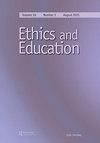Animal advocacy, fear and loathing in academia: a response to Helena Pedersen
IF 0.7
Q3 EDUCATION & EDUCATIONAL RESEARCH
引用次数: 0
Abstract
ABSTRACT Helena Pedersen’s powerful keynote address poses the question: What prevents education from becoming a transformative force in times of ‘omnicide’, that is, ‘the annihilation of everything’? She locates at least part of the response in ‘institutional anxiety’, which constitutes a (social-) psychological barrier to radical change. In particular, she discusses anxiety related to the moral standing of non-human animals as a threat to human exceptionalism in educational practice and research. Institutional anxiety, as I show in my discussion of a recent manifestation at a university in South Africa, also occurs in post-liberation societies, when ‘university teachers confront’ or consider confronting ‘their own colleagues with requests for deconstruction of the anthropocentric infrastructure of their own workplace’ (Pedersen), colleagues they know to have been historically marginalised or disenfranchised. However, as I hope to make clear in my response, there are some ways of confrontation that are less divisive than others.动物在学术界的倡导、恐惧和厌恶:对海伦娜·彼得森的回应
海伦娜·佩德森强有力的主题演讲提出了一个问题:是什么阻碍了教育在“种族灭绝”(即“毁灭一切”)时代成为一股变革力量?她将至少一部分的反应定位于“制度焦虑”,这构成了激进变革的(社会)心理障碍。特别是,她讨论了与非人类动物的道德地位有关的焦虑,作为对教育实践和研究中人类例外论的威胁。正如我在讨论南非一所大学最近的表现时所显示的那样,制度焦虑也发生在解放后的社会中,当“大学教师面对”或考虑面对“他们自己的同事,要求解构他们自己工作场所的人类中心主义基础设施”(Pedersen)时,他们知道这些同事在历史上被边缘化或被剥夺了公民权。然而,正如我希望在我的答复中阐明的那样,有一些对抗方式比其他方式更不具有分裂性。
本文章由计算机程序翻译,如有差异,请以英文原文为准。
求助全文
约1分钟内获得全文
求助全文

 求助内容:
求助内容: 应助结果提醒方式:
应助结果提醒方式:


